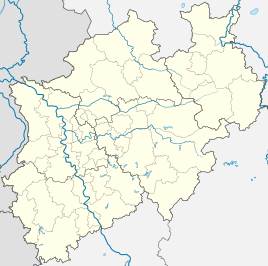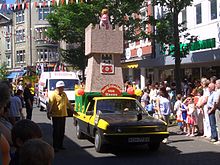Hasp
|
Hasp
City of Hagen
|
||
|---|---|---|
| Coordinates: 51 ° 20 ′ 52 ″ N , 7 ° 25 ′ 25 ″ E | ||
| Height : | 124-143 m above sea level NHN | |
| Area : | 22.2 km² | |
| Residents : | 29,245 (2013) | |
| Population density : | 1,317 inhabitants / km² | |
| Incorporation : | August 1, 1929 | |
| Postcodes : | 58135, 58089 | |
| Area code : | 02331 | |
|
Location of Haspe in North Rhine-Westphalia |
||
Hasp is the name of a district of the independent city Hagen in the eastern Ruhr area . The district through which the Ennepe flows had 29,245 inhabitants in 2013.
history
Documentary evidence is the peasantry hasp already from the 12th century, when the rule of the noble lords of Volmarstein belonged. In the 13th century Haspe was the seat of a free chair .
A first comprehensive list of the landowners in Haspe can be found in the treasury of Grafschaft Mark from 1486. At that time, Haspe belonged to the Wetter office and the Hagen court. By decree of Napoleon I of November 18, 1808, the municipality , the Enneperstraße district , was formed from the five farmers ' communities Haspe, Westerbauer , Waldbauer , Vorhalle and Voerde . Voerde left the company in 1868 and Haspe followed in 1874.
In the 19th century, the rural community of Kückelhausen came to Haspe in 1856 . When Haspe was granted city rights by decree of the Prussian king on December 20, 1873 , the city had around 9800 inhabitants.
On April 1, 1898, the rural community Westerbauer was united with the city of Haspe. In the 1905 census , Haspe was found to have a population of just under 20,000, and the Hasper Dam was built in 1904 to provide drinking water .
On August 1, 1929, Haspe was incorporated into the city of Hagen together with the municipalities of Boele , Fley , Halden , Herbeck , Holthausen and Vorhalle as part of the municipal reorganization of the Ruhr area . This ended the history of the independent town of Haspe after 56 years.
Demographic statistics
On December 31, 2018, there were 30,860 residents in the Haspe district. 17,817 of them lived in the statistical district Haspe-Ost and 13,043 inhabitants in the statistical district Haspe-West.
Structural data of the population in Haspe (city district):
- Proportion of the population under 20 years of age: 19.9% (Hagen average: 19.4%)
- Share of the population of at least 60-year-olds: 26.4% (Hagen average: 28.3%)
- Proportion of foreigners: 20.3% (Hagen average: 19.1%)
Haspe-East
Structural data of the population in the statistical district Haspe-Ost:
- Proportion of population under 20-year-olds: 21.8% (Hagen average: 19.4%)
- Proportion of population of at least 60-year-olds: 24.9% (Hagen average: 28.3%)
- Proportion of foreigners: 24.2% (Hagen average: 19.1%)
Hasp-West
Structural data of the population in the statistical district Haspe-West:
- Share of the population under 20 years of age: 19.6% (Hagen average: 19.4%)
- Proportion of population of at least 60-year-olds: 28.5% (Hagen average: 28.3%)
- Proportion of foreigners: 15.0% (Hagen average: 19.1%)
Economy and Infrastructure
economy
From 1906 to 1913 the Hasper iron and steel works (popularly known as Hasper Hütte ) was significantly enlarged under the direction of Peter Klöckner and Director Haenel. The plant, which in its heyday had almost 10,000 employees, no longer exists today.
Since 1780, the well-known Eversbusch Doppelwachholder with 46 vol .-% has been distilled in Haspe, which is known far beyond the Hasper borders as Hasper Maggi and is very much appreciated. The second “h” in Doppelwachholder is, as the Eversbusch distillery assures, not a misprint. This spelling has outlasted all spelling reforms and is still a traditional feature on bottle labels today. In the past there were also various breweries such as the Pfingsten Brewery and the Andreas Brewery, but none of them are brewed in Haspe anymore.
The nationwide well-known (also founded in Haspe) company Brandt (known primarily for its production of rusk) has relocated its production from Hagen-Haspe to the new federal states for cost reasons - only the company administration is still based in Haspe.
The headquarters of Nordwest Handel AG were located in Haspe until September 2016 . At the end of June 2013 it was announced that the company would give up its headquarters in Hagen-Haspe in 2015 and move to Dortmund- Hörde in the area of the technology and service location Phoenix-West .
Today, Haspe is only home to small and medium-sized businesses. There are also numerous retail outlets.
traffic
Transportation
The Düsseldorf-Derendorf-Dortmund Süd railway line runs through Haspe . The S8 of the S-Bahn Rhein-Ruhr stops at Hagen-Heubing station in Haspe . This is located on the banks of the Ennepe just a few hundred meters north of the center of Haspe.
In the center of Haspe are the two bus stops Hasper Torhaus (formerly Hasper Kreisel ) and Haspe Zentrum , from which eight Hagener Straßenbahn AG bus lines run to Hagen-Zentrum, the surrounding districts, but also to Ennepetal and Breckerfeld .
Also formerly trains on the Elberfeld – Dortmund railway stopped at Hagen-Haspe station , which was taken out of service for passenger traffic on March 27, 1979. The small train to Voerde and Ennepetal , later converted into an intercity tram , was shut down in 1963.
Road traffic
The federal road 7 ran through Hagen-Haspe, which was rededicated in 2015 in the Haspe area to the state road 700. The closest motorway junction is junction (89) Wetter-Volmarstein of the A1 motorway , accessible via Grundschötteler Straße.
Mining in Haspe
In Haspe mining was carried out from 1836 to 1935, this was limited to the mining of iron stone. This explains the former settlement of small hammer mills , the Harkort factory and other iron and iron ore processing companies as well as the Markana hut (1836–1873) and the Hasper hut (1847–1982). The mining in Haspe was subordinate to the Dortmund Oberbergamt . Haspe kept his own mountain land register.
health
- The Evangelical Hospital Hagen hasp on the Pug is a hospital of primary care . The Evangelical Volmarstein Foundation , based in Wetter (Ruhr) , has been a partner in the hospital GmbH since 2007 . The hospital has 314 beds and treats around 11,000 inpatients annually. The Clinic for Internal Medicine and the Clinic for General Surgery with a focus on trauma surgery, orthopedic surgery and visceral surgery take part in the emergency care of the city of Hagen and the southern Ennepe-Ruhr district. The women's clinic focuses on urogynecology and laparoscopic surgery ; obstetrics was discontinued in 2018. The Rheumatology Clinic and the rheumatoid orthopedics department of the Volmarstein Orthopedic Clinic form the South Westphalia Rheumatism Center .
- Retirement and nursing home next to the hospital; Carrier: Ev. Volmarstein Foundation.
- Day care offer in the center of Haspe.
- Therapy center am Mops , since 2008 establishment of the Ev. Volmarstein Foundation.
Sports
- Soccer: Hasper SV ; District league A
- Soccer: Fortuna Hagen; District League B
- Blau Weiss Haspe 1968; District league A
- Basketball: SV Hasp 70; Regionalliga West .
- Gymnastics: TGS Friesen Haspe
- Bounce ball : TGS Friesen Hasp
- Volleyball : TGS Friesen Haspe
- Athletics: LG Haspe
- Hasper Fencing Club 1932/97
- Sports shooting: Tückinger Schützenverein 1872; Hestert shooting club 1954
- Westerbauer shooting club 1869
- Judo School Kohnert - Budo Club Asahi Hagen
- Baseball: Hagen Chipmunks
leisure
Haspe has the outdoor pool on the Hestert and a sports and leisure facility on the Hüttenplatz. The 1st Musikcorps Blau-Weiss Hagen-Haspe 1959 also appears under the name Blueline Show & Marching Band .
The Hasper Kirmes takes place annually in mid-June, initiated by the Hagener Schausteller Verein. The highlight is the big Hasper Kirmes pageant, which takes place on the Saturday before the 3rd Sunday in June. This is organized by Hasper home and Customs Association (HHBV) floats parade , like a Rosenmontagszug.
Personalities
- Louisa Catharina Harkort (* 1718; † 1795 in Haspe), entrepreneur
- Friedrich Harkort (* 1793 in Haspe; † 1880), entrepreneur and politician
- Paul Harig (* 1900; † 1977 in Haspe) politician of the KPD and member of the first Bundestag
- Gustav Harkort (* 1795 in Haspe; † 1865), entrepreneur, railway pioneer and politician
- Eduard Harkort (* 1797 in Haspe; † 1836), mining engineer and officer
- Paul Freytag (* 1873 in Haspe; † 1954), painter and draftsman
- Franz Weber (* 1888 in Haspe; † 1962), actor
- Fritz Breuer (* 1896; † 1965), surgeon
- Heinrich Cordes (* 1906 in Haspe; † 1999), chemist and university professor
- Ernst Meister (* 1911 in Haspe; † 1979), poet
- Hermann Höhn (* 1912 in Haspe; † 1997), Protestant pastor
- Herbertus Bikker (* 1915; † 2008 in Haspe), war criminal and member of the Waffen SS
- Hermann Steinthal (* 1925 in Haspe; † 2014), high school teacher, classical philologist and didactic specialist
- Wolfgang Schrage (* 1928 in Haspe; † 2017), Professor of the New Testament at the University of Bonn
- Michael Binnewies (* 1947 in Haspe), chemist, professor at the Leibniz University of Hanover
Web links
- Forced laborers on the premises of the Hasper Hütte during the Second World War
- Information about the Eversbusch distillery
- Haspe in the Westphalia Culture Atlas
Individual evidence
- ^ City of Hagen: Population in the Hagen districts 2013 ( Memento from June 6, 2014 in the Internet Archive ) (PDF; 17 kB), accessed on January 3, 2015
- ↑ a b Stephanie Reekers: The regional development of the districts and communities of Westphalia 1817-1967 . Aschendorff, Münster Westfalen 1977, ISBN 3-402-05875-8 , p. 241 .
- ↑ Population figures of the districts
- ↑ Proportion of the population under 20 years of age
- ↑ Proportion of the population aged 60 and over
- ↑ Proportion of foreigners in the city districts
- ↑ Northwest Exodus shocks the city , June 28, 2013, accessed on July 25, 2013, on derwesten.de
- ↑ Peter Wiegand (arrangement), State Archives Münster: The holdings in the North Rhine-Westphalian State Archives / The Prussian mining, smelter and saltworks administration 1763-1865 . 1st edition. Landesarchiv Nordrhein-Westfalen, Münster 2000, ISBN 3-932892-13-5 .
- ↑ Westfalenpost of December 4, 2017







